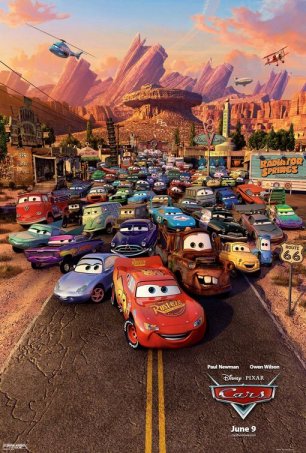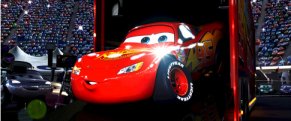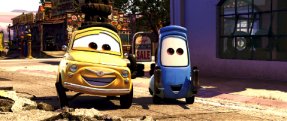|
Cars
John
Lasseter knows that appreciation is pretty tough to come
by these days, especially in the age of ease and convenience.
When the credits roll in the cinemas, everyone takes the
cue as a sign to rush to the exits rather than sit back
and soak in the sheer number of people involved in the production
of a feature film. They put the hours in so it only feels
right to take the time to sit and watch the names roll by
on-screen.
At the
very least, the walk out will have less of a herded cattle
feel to it.
Before
becoming labeled as a curmudgeonly film buff, it behooves
me to point out that there are other such forms of “appreciation”
out there to enjoy. Some fanboys swear by the feel of individual
issues when reading comics over the convenience of collected
graphic novels. Digital music will never have the kind of
body and depth that vinyl provides, no matter what anyone
says.
Sure,
its nice to read complete comic story arcs in collected
editions while listening to my iPod on shuffle, that’s
just plain convenient, but taking the time out to actually
appreciate the craftsmanship as they were, in many cases,
intended to be experienced, is a luxury rarely afforded
by many these days. Myself included.
For
Lasseter, his love affair is classic cars and the nostalgic
backroads and small towns they once purveyed while trekking
about the greater United States. He has long hinted at this
love affair, and his intent to pay homage to it in Cars,
but nothing seen to date has even hinted at this theme within
the film.
Instead,
everything leaked to date has seemed to point to the contrary.
Sleek Nascar style racing cars bulleting around tracks that
look so detailed that one nearly forgets to acknowledge
that the cars in question have human-like faces. Nearly.
The story begins simply enough, a young stud of a race car
named Lightning McQueen (Owen Wilson) is only moments away
from becoming the first rookie to win the coveted Piston
Cup. During the race we learn that McQueen sees himself
as a lone wolf, the quintessential “I” in team.
Who cares if it isn’t in there, he’ll find a
way to make it work without anyone else’s help.
Wilson
plays McQueen innocently enough so that his hubris never
really comes off as overbearingly cocky, but rather just
one of those things we all have to face while growing up.
Even as his decision to ignore his pit crew comes back to
haunt him, McQueen is overall a sympathetic character.
McQueen
dreams of a big time contract with the industry leader,
DinoCo, whose longtime race car The King (Richard Petty)
is inching his way closer to retirement. Standing in his
way is Chick Hicks (Michael Keaton) a desperate car eager
to become the next DinoCo race car. His current sponsor,
Hostile Takeover Bank, is sure to provoke chuckles from
the adults in the audience.
These
three find themselves in a three-way tie for first place,
and a race-off is scheduled across country in Los Angeles.
The first person to arrive is promised extra crucial time
to schmooze the DinoCo honchos.
With
so much on the line, it is only natural that our hero, in
desperate need of learning his lesson, will end up stranded
in the small forgotten town of Radiator Springs, somewhere
along Route 66. McQueen finds himself indebted to the town’s
residents after destroying the main drag of the one stoplight
town, and he begrudgingly sets about making things right
by repaving the road with an asphalt laying behemoth named
Bessie.
Although
there is much for McQueen to learn from the cars he meets
in Radiator Springs, Lasseter and company dig deeper than
the mere surface level lessons of learning and appreciation.
The message here is aimed at the rest of us, and the lack
of human characters, although seemingly jarring at first,
seems like a well calculated statement when considered in
retrospect.
To detail
the goings on in Radiator Springs and discoveries McQueen
makes about himself, the town, and its residents would steal
away some of the magic that makes Pixar films so endearing,
so we’ll leave it at that in terms of plot.
Once
again, the voice talent of the film really elevates the
characters beyond their mere automotive appearances. Among
the Radiator Springs residents, Paul Newman, Cheech Marin,
Bonnie Hunt, and George Carlin all turn in solid performances.
Larry the Cable Guy’s turn as Mater is less grating
than one would have been led to believe from the “dagum”
filled teaser trailer.
What
continues to amaze is how Pixar, a company employing the
cutting edge of digital animation technology in their productions,
still manages to work from a very organic and grounded foundation
of story and resonance. Their films continue to be personal,
connecting with audiences on a very real level, without
ever pandering to their viewers or letting the technology
take up residence in the driver's seat.
Even
Lasseter knows that rolling credits clears seats, and he
rewards those who sit through the credits with increasingly
funnier bonus footage to soak up. Chock full of Toy
Story references, cameos, and in-jokes, Cars
turns out to be as solid as one would expect from Pixar.
There has also been much lip-service paid to the possible
miss for Pixar with Cars, and although this film
will certainly not sate fanboy wet-dreams in the same fashion
as Brad Bird’s The Incredibles, it certainly
lives up to the Pixar name in terms of quality one comes
to expect from the Emeryville company.
Rating:

Extra
note from Derek: Part of the end credits includes a tribute
to Joe Ranft, who has also been given co-director credit.
Ranft died last year, and this will be the last film to
have his influence.
|








